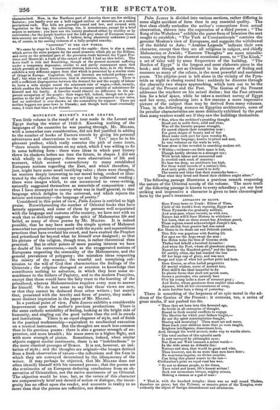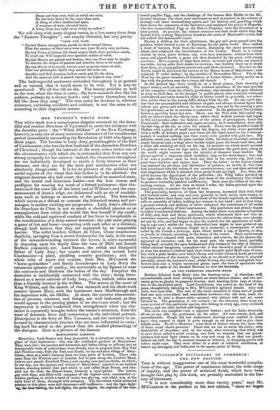MONCICTON MILNES'S PALM LEAVES.
TIT'S little volume is the result of a tour made in the Levant and Egypt during the winter of 1842-3. Knowing nothing of the languages of the countries he was passing through, Mr. MiLnes, with a somewhat rare consideration, did not feel justified in adding to the number of books of Eastern travels by giving his personal adventures and observations to the world. " Yet," says be in his pleasant preface, which really contains the pith of some tours, "there remain impressions on my mind, which I was willing to fix in some befitting form : there were ideas in which past history threw its shadows before me into the future, in shapes I did not wish wholly to disappear ; there were observations of life and manners, which seemed contradictory to many established European notions regarding the East, and which therefore, if just, might have some small rectifying value ; there were thoughts, on matters deeply interesting to our moral being, evoked or illus- trated by the objects that met my eye and by collateral reading ; there were images which, to one accustomed to verse-writing, naturally suggested themselves as materials of composition : and thus I have attempted to convey what was in itself general, in that language whirls delights in the universal, and which rejects the minute and transitory—the language of poetry." Considered in this point of view, Palm Leaves is entitled to high praise. Notwithstanding the number of Oriental books that have latterly appeared, and some of them by persons well acquainted with the language and customs ofthe country, we have met with no work that so distinctly suggests the spirit of Mahonsetan life and belief, as many of these poems by Mr. MILNES. It is indeed possible, that he may have made the simple system of Mahomet somewhat too prominent compared with the mystic and superstitious practices that have overlaid his creed, and have exalted the Prophet and priesthood far beyond what he himself ever designed ; so that his picture of the religion, though true, is rather theoretical than practical. But in other points of more passing interest we have no doubt of his correctness,—such as the exaggerated notions of Europeans respecting the sensuality of the Mahometans, and the general prevalence of polygamy ; the mistaken ideas respecting the misery of the women; the trustful and unrepining sub- mission to the will of God that characterizes the feelings of the Orientals ; the religious disregard or aversion to knowledge that contributes nothing to salvation, in which they bear some re- semblance to the fathers of Papistry, and to the modern Puseyites, except that these would have the laity trust to the learning of the priesthood, whereas Mahometanism requires every man to answer for himself. We do not mean to say that these views are new, or that they cannot be deduced from other writers ; but merely that, presented with the brevity and force of poetry, they make a more distinct impression in the pages of Mr. MILNES. In a poetical point of view, Palm Leaves exhibits a considerable improvement upon the author's previous productions. There is the same catholic amiability of feeling, looking at the bright side of humanity, and singling out the good rather than the evil in creeds and institutions. There is an equal elegance of style, and of finish in the poetical workmanship—equivalent to mechanical execution on a musical instrument. But the thoughts are much less common than in his previous poems : there is also a greater strength of ex- pression, and more breadth ; his muse soars to a higher flight, and with more strength of pinion. Sometimes, indeed, when similar objects suggest similar sentiments, there is an "indebtedness" to the more classical passages of BYRON. It is not, however, an imi- tation of style ; and the thoughts are original—the images derived from a fresh observation of nature—the reflections and the form in which they are conveyed determined by the idiosyncrasy of the writer. It may perhaps be objected, that Mr. MILNES does not often identify himself with his assumed person ; that the poems are the sentiments of an European deducing conclusions from an ob- servation of Orientalism, not the native sentiments of an Oriental. The objection would be true, but, as the verses of this character are comparatively brief and devoid of action or dialogue, the incon- gruity has no effect upon the reader, and amounts in reality to no more than that the poems are reflective, not dramatic. Palm Leaves is divided into various sections, rather differing in some slight accident of form than in any essential quality. The first class chiefly embodies the author's conceptions from actual observation, thrown into the expression of a third person ; "The Song of the Wahabees" exhibits the purer form of Islamism the sect sought to establish; "The Turk at Constantinople" contains the genuine Moslem's view of Europeans, and suggests the withdrawal of the faithful to Asia; "Arabian Legends" indicate their own character, except that they are all religious in subject, and chiefly Mahometan or Jewish; "Eastern Thoughts" are more miscella- neous, varying from the shortest occasional poem, to "The Kiosk," a set of tales told by some frequenters of the building. "The Burden of Egypt" is the longest and most elaborate piece in the book ; and though not so Oriental in its pictures of feeling and manners as many of the others, is the most powerful and sustained poem. The pilgrim-poet is left alone in the vicinity of the Pyra- mids as night is closing round Mtn : suddenly be discerns through the obscurity two shapes approaching, which turn out to be the Genii of the Present and the Past. The Genius of the Present addresses the wayfarer on his actual duties ; but the Past attracts him for a brief space, while he takes a succinct survey of Egypt and her story, condensing into a few stanzas a more impressive picture of the subject than may be derived from many volumes. Thus, in the following stanzas on Egyptian architecture, some of its peculiar characteristics are more distinctly exhibited by the poet than many readers would see if they saw the buildings themselves.
" Nor, when the architect's presiding thought Stood out in noble form, solid and clear, Was all the hieratic purpose wrought, Or sacred objects their completion near : For giant shapes of beauty and of fear Must make each part for open worship fit,
And mystic language, known to priest and seer,
In very volumes on the walls be writ, Whose sense is late revealed to searching modern wit.
44 Within—without—no little space is lost, Though hardly obvious to a stranger eye; With lavish labour and uncounted cost Is overlaid each nook of masonry : No base too deep, no architrave too high, For these weird records of a nation's lore, And early pride, that yearn'd to deify The names and titles that their monarchs bore— That what they loved and feared their children might adore."
The following passage illustrates a previous remark respecting the nature of the Oriental novelty of the volume. The mere truth of the following passage is known to every schoolboy ; yet see how striking and impressive a character is given to bare chronological facts by the poet's treatment.
ANTIQUITY OF EGYPT.
Here Fancy bows to Truth: Eldest of Time, Child of the world's fresh morning, Egypt saw These Pyramids rise gradually sublime, And mras pass, whose records, as with awe, Nature has will'd from History to withdraw : Yet learn, that on these stones has Abraham gazed,
These regions round acknowledged Joseph's law, That obelisk from granite bed was raised
Ere Moses in its shade sat and Jehovah praised. This Nile was populous with floating life For ages ere the Argo swept the seas : Ere Helen woke the fires of Grecian strife Thebes bad beheld a hundred dynasties : And when the Poet, whom all grandeurs please, Named her the Hundred-gated,' and the Queen Of earthly cities, she had reached the lees Of her large cup of glory, and was seen Image and type of what her perfect pride had been.
Here Greece, so often hailed progenitrix Of mortal wisdom, nurse of ancient lore, First skill'd the ideal beautiful to fix In plastic forms that shall not perish more, Seems a pretender, who astutely bore O'er his young locks a show of reverent grey ;
And Rome, whose greatness thou couldst once adore,
Appears, with all her circumstance of sway, A mere familiar face, a thing of yesterday.
There is something of the largeness of an epic moral in the ad- dress of the Genius of the Present : it contains, too, a series of great truths, if not pushed too far.
" Thou that art born into this favoured age, So fertile in all enterprise of thought, Bound in fresh mental conflicts to engage
The liberties for which your fathers fought,—
Be not thy spirit contemplation-fraught, Musing and mourning! Thou must act and move, Must teach your children more than ye were taught, Brighten intelligence, disseminate love, And, through the world around, make way to worlds above. 44 The total surface of this sphered earth
Is now surveyed by philosophic eyes; Nor East nor West conceals a secret worth—
In the wide ocean no Atlantis lies: Nations and men, that would be great and wise,
Thou knowest, can do no more than men have done;
No wondrous impulse, no divine surprise,
Can bring this planet nearer to the sun—
Civilization's prize no royal road has won.
• ' So not to distant people, to far times, Turn mind and heart, life's honest artisan! Seek not miraculous virtues, mighty crimes, Making a dwmon or a god of man :
That is, with the hundred temples: there was no wall round Thebes, I therefore no gates; but the Pylones, or massive gates of the Temples, were evidently the object of foreign astonishment and admiration.
Deem not that ever, wide as mind can scan, He has been better in the mass than now, A thing of wider intellectual span, A creature of more elevated brow, A being Hope has right more richly to endow."
We will close with some elegant verses, in a less massy form, from the "Eastern Thoughts " ; not exactly Oriental, but very pretty.
"LOSS AND GAIN.
" Myriad Roses, unregretted, perish in their vernal bloom, That the essence of their sweetness once your Beauty may perfume.
Myriad Veins of richest life-blood empty forth their priceless worth, To exalt one Will imperial over spacious realms of earth.
Myriad Hearts are pained and broken, that one Poet may be taught To discern the shapes of passion and describe them as be ought. Myriad Minds of heavenly temper pass as passes moon or star, That one philosophic Spirit may ascend the solar car.
Sacrifice and Self-devotion hallow earth and fill the skies, And the meanest Life is sacred whence the highest may arise."
The half-regretful sentiment embodied throughout is so general and so natural, that it would seem to be true. Yet it may be questioned. We all live till we die. The beauty perishes as well as the rose, when the time is come ; the hero-monarch dies like his soldiers, perhaps by a slower death ; and " poets themselves must fall like those they sang." The true point for decision is, whether existence, excluding accidents and conduct, is not the same to all according to their respective nature.



























 Previous page
Previous page